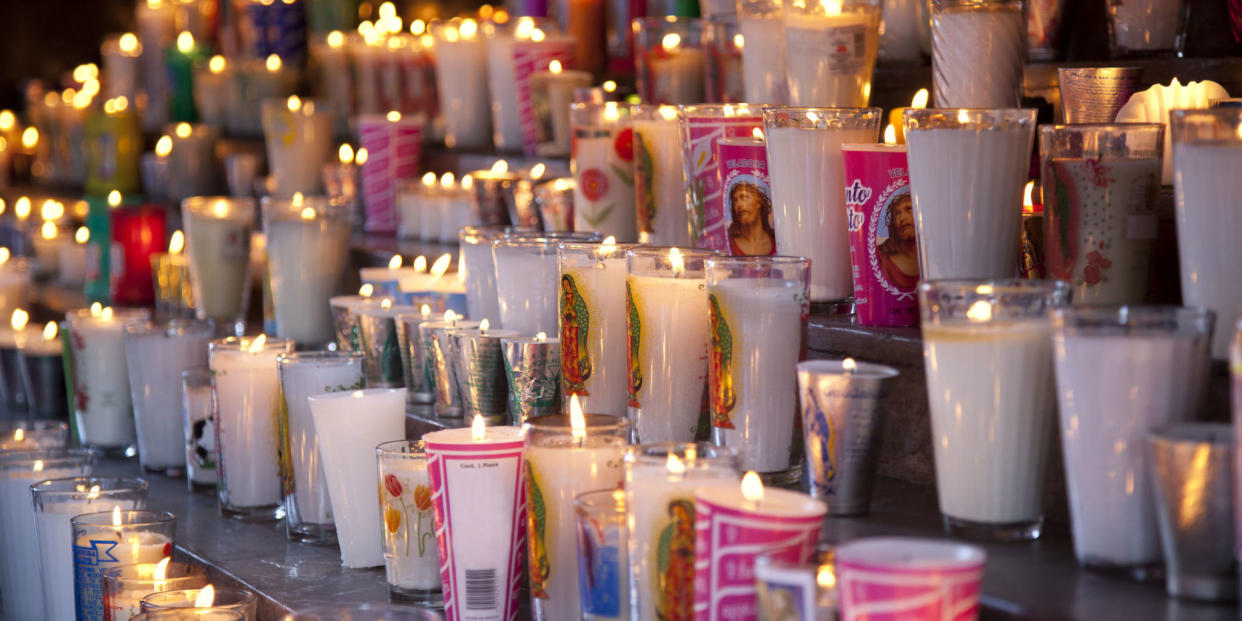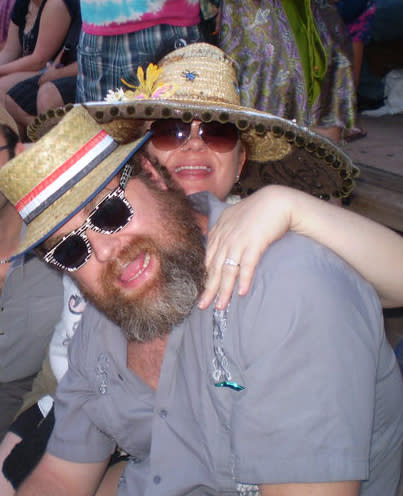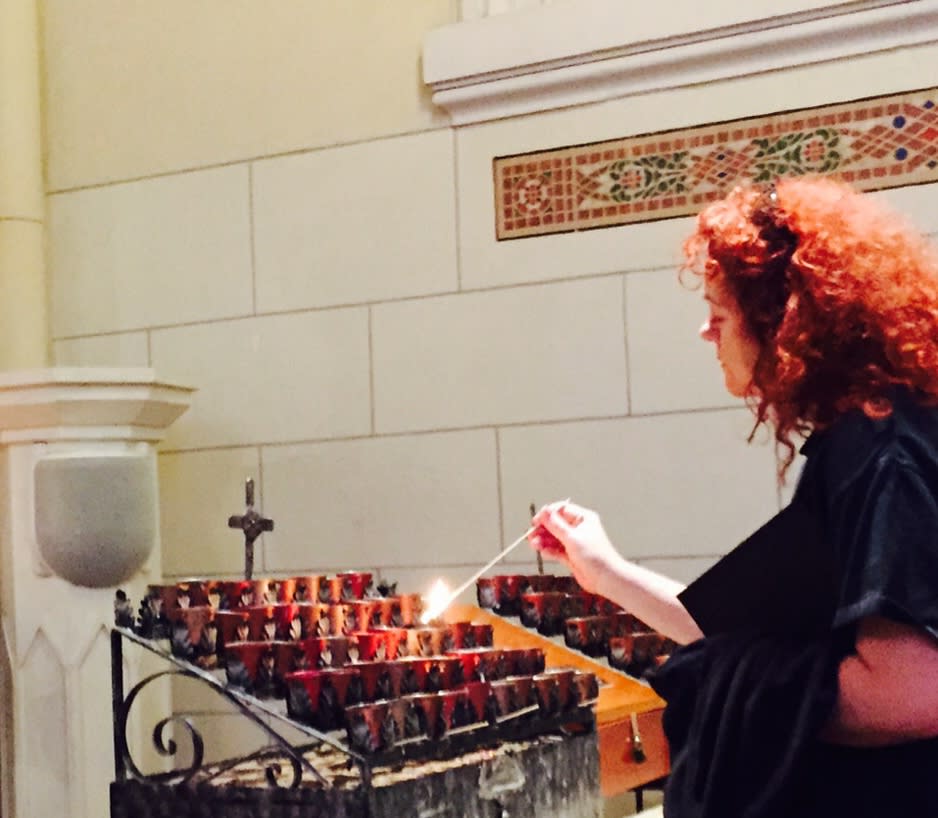I Was an Atheist. Then My Brother Died of an Overdose.

I can pinpoint exactly the moment when my spiritual life began. It was a warm, sunny, late May day in central Pennsylvania. My dad and I were sitting in my parents' backyard. The trees were finally in full leaf and the rhododendrons were blooming, their gaudy pink-purple heads bobbing in the breeze. Honeysuckle and lilac scented the air, bees buzzed and birds sang, and if my brother wasn't dead it all would have been perfect. But he was...dead for about a week, of a heroin overdose, and my father and I were trying to get the house together for the backyard memorial we were having for him in a couple of days.
We'd hit a snag. In the midst of power washing the back porch the hose had burst. We needed to disconnect it so we could hook up the new one, but the nozzles joining the power washer to the split hose wouldn't be budged. When we tried to unscrew them it felt like they had been welded together. My dad took a turn trying to loosen them, and then I did, and then he did again. They were stuck fast.

I remember sitting there in the sun, both of us with our heads bowed in utter defeat. I felt as exhausted as I'd ever been in my life. Numb, too, my mind dull. "Dad, I don't know what to do," I'd said. "We need to finish the porch now so it can dry and we can get the furniture back on it. What…what do we do?"
"I don't know, Jill," my dad answered, not even lifting his head. "I don't know."
My mind turned to my brother-my big, powerful brother. So full of life for 43 years, until one day suddenly all that life was just...gone. Vanished. I thought about Gunnar's wide shoulders, his strong arms. I thought about it and then I said to him, quite clearly in my mind, "Come on, Gun. We could use your strength, here. Give us a hand, okay? Please?"
"Neither one of us had been to church since I was a child, but in that moment I understood that we, our souls, continue on after our bodies die."
Without a pause I picked up the nozzles. They almost fell apart in my hands. I barely had to unscrew them.
My dad gasped. "How did you do that, Jill?"
"It wasn't me," I answered immediately. "It was Gunnar." I explained to my father what had happened, how I'd asked for Gunnar's help and he'd given it. I knew it without question. I'd felt my brother. He was with us, looking out for us.
"I wish I could believe that," Dad had said. He was a lifelong atheist, with no use for religion, or God, or spirituality of any kind. I was less sure, more open to at least the possibility of life after death. Neither one of us had been to church since I was a child. But in that moment I understood that we, our souls, continue on after our bodies die.
"You should believe it, Dad, because it's true," I told him. "Gunnar's here. And he's okay." I began crying. "He's okay."
That was almost three years ago. In that time I've found myself in a lot of churches. It's something even non-spiritual travel journalists tend to do: visit places of worship in the far-flung cities and towns to which we journey. But since Gunnar died it's become a different experience for me. When I enter a holy place now I no longer only admire the architecture, or enjoy the great stillness that almost always fills such spaces. Now I make sure no matter where I am I light a candle for my brother.

I've lit candles for him everywhere from Notre-Dame Cathedral in Paris to the Basilica of the National Vow in Quito, Ecuador. I light a candle and I sit and I think about him. I talk to him. I tell him I miss him and I can't wait to see him again. I always cry, but I never regret lighting the candle. Sometimes I think I'd like to spend all day on one of those pews, soaking in the tranquility, quieting my mind, opening my heart. When I unexpectedly catch a bit of a service, like I did in Ecuador, where they were honoring a fallen police officer, I'm grateful.
Lately, my father, my once resolutely atheist father, has begun telling me about how he believes Gunnar's spirit, his soul, visits him. My dad says he feels Gunnar now, in his bedroom at night, or around the house during the day. Like if his eyes were just a little bit better he could see his son there, watching over him. It's taken a little longer, but my brother's death seems to have had the same effect on my father as it did on me. I don't know if we'll ever become church-goers, through I recently attended the service a friend, a Unitarian minister, gave in the Philadelphia area. Whether or not I ever pass through the doors of a church again, whether or not my father does, really doesn't matter. Losing Gunnar has resulted in what I can only call a spiritual awakening for us both.
"Whether or not I ever pass through the doors of a church again, whether or not my father does, really doesn't matter. Losing Gunnar has resulted in a spiritual awakening."
But why? Are we simply avoiding reality? Is the idea that Gunnar is gone forever so terrible we'll rush to any comfort available, even one we once considered fantasy? Maybe. In a way, I can't understand people who lose someone greatly loved and remain atheist. How do they stand the idea that they will never know that person again? I think if I believed my brother and I would never be reunited I might not be able to endure it. Almost three years out from his loss and it still hurts as badly as it did the day I found out he was dead, if differently-deeper, but less sharply. I know for my father it is the same. Worse, actually, because he lost his son, more awful even than losing a brother.
But here's the thing: I've felt Gunnar with me. And I don't just mean when I see the big, raucous blue jay in our yard that always reminds me of him, or the time right after he died a little black bear came bounding across my friend's yard, so joyous and free I instantly believed Gunnar's spirit was somehow within that bear. There have been a few other moments, stronger still, when I've sensed his presence with me, the way my father has. Dad's even begun talking to Gunnar, and I know it brings him peace. It doesn't mean we don't miss my brother. We miss him and we mourn him every single day. But we also have hope that we will see him again. That hope-that faith-is enough to keep us going when the pain of his loss flares up big and bright. I can't help but think it's in some way a gift from Gunnar, a final gesture of love from the man taken far, far too soon from us.
Follow Woman's Day on Instagram.
You Might Also Like

